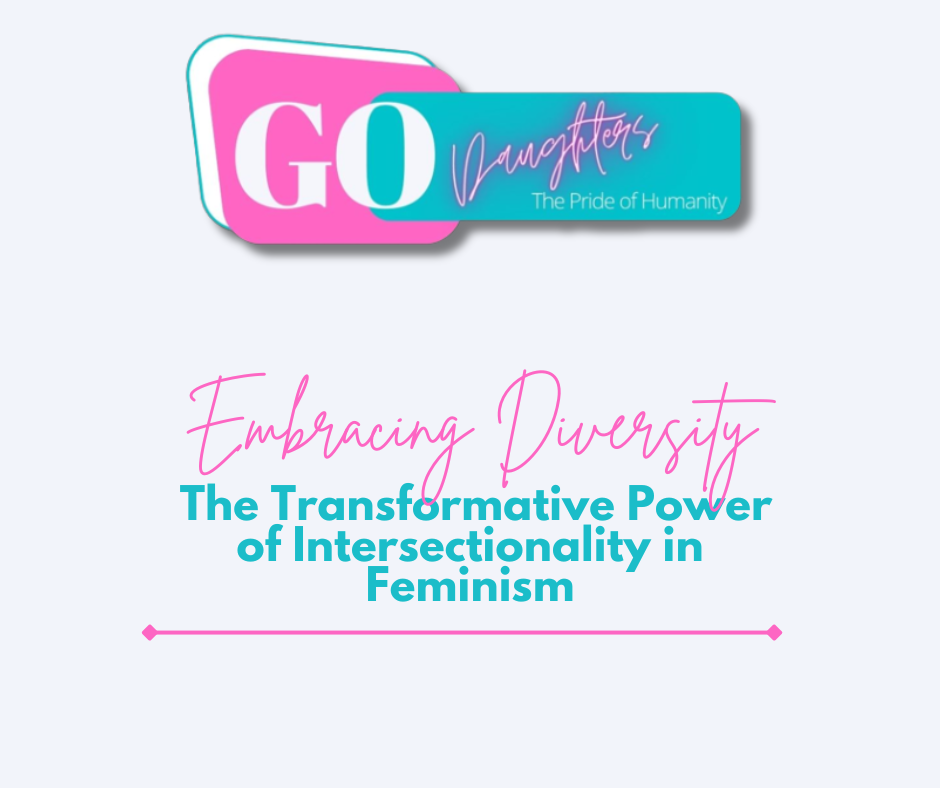
Introduction:
In the ever-evolving landscape of feminism, the concept of intersectionality has emerged as a powerful lens through which we can truly understand and address the diverse experiences of individuals. Intersectionality goes beyond the one-size-fits-all approach, recognizing that people’s identities are complex and interconnected. In this blog, we will delve into the profound significance of intersectionality in feminism, exploring how it enriches our understanding of gender issues and contributes to a more inclusive and empowering movement.
Understanding Intersectionality:
Intersectionality, a term coined by legal scholar Kimberlé Crenshaw in the late 1980s, urges us to consider the overlapping and interlocking systems of oppression and privilege that individuals may experience. It emphasizes the need to recognize the intersection of various social categories, such as race, class, gender, sexuality, and ability, in order to comprehensively address the challenges faced by individuals with multiple marginalized identities.
Breaking Down Silos:
Traditional feminist discourse has sometimes been criticized for its failure to acknowledge the diversity of women’s experiences. Intersectionality, however, challenges the notion of a homogeneous “women’s experience” and calls for a more nuanced and inclusive understanding. By breaking down silos and embracing the complexity of identities, intersectional feminism paves the way for a movement that truly represents and advocates for all women.
The Ripple Effect of Intersectionality:
The impact of intersectionality extends far beyond academic discussions. In real-world terms, it means recognizing and dismantling the barriers that compound the challenges faced by marginalized individuals. Whether it’s in the workplace, healthcare, education, or activism, an intersectional approach enables us to develop more effective solutions by addressing the root causes of inequality.
Empowering Voices:
One of the greatest strengths of intersectionality is its ability to amplify the voices of those who have historically been marginalized and silenced. By acknowledging the unique struggles faced by individuals with intersecting identities, we create space for diverse perspectives and foster a sense of belonging within the feminist movement.
Addressing Systemic Injustices:
Intersectionality prompts us to look beyond individual experiences and confront systemic injustices. It challenges us to examine the ways in which various forms of oppression are interconnected and mutually reinforcing. By understanding these complex dynamics, we can work towards dismantling the structures that perpetuate inequality.
Practical Steps Towards Intersectional Feminism:
- Education and Awareness: Foster a culture of learning within the feminist community. Encourage discussions about intersectionality and provide resources to enhance understanding.
- Inclusive Advocacy: Ensure that advocacy efforts are inclusive and consider the unique challenges faced by individuals with intersecting identities. This may involve adjusting policy recommendations, outreach strategies, and communication approaches.
- Amplify Diverse Voices: Actively seek out and promote the voices of individuals with intersecting identities. This could involve featuring diverse perspectives in publications, conferences, and social media platforms.
- Collaboration: Foster collaboration between different social justice movements. Recognize that issues of gender justice are interconnected with racial, economic, and other forms of justice.
Conclusion:
Intersectionality is not just a theoretical framework; it’s a transformative tool that allows us to build a more inclusive and equitable world. By embracing the complexities of identity and acknowledging the interconnected nature of oppression, we can strengthen the feminist movement and work towards a future where every individual, regardless of their background, can thrive. As we navigate the path forward, let us remember that true empowerment lies in unity, diversity, and the unwavering commitment to justice for all.




